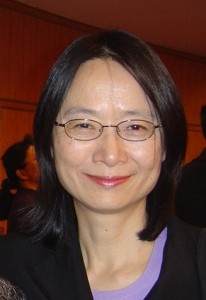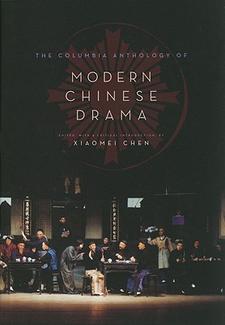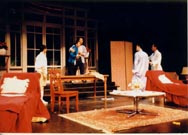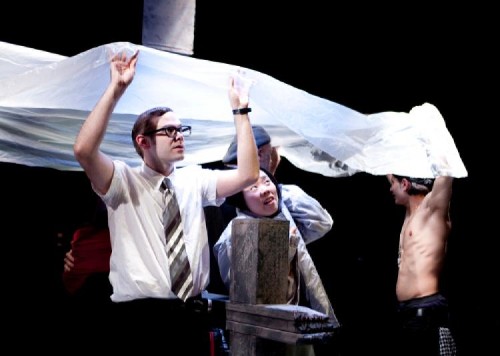Book Review: An Authoritative Anthology of Modern Chinese Drama
Minor translation issues aside, The Columbia Anthology of Modern Chinese Drama‘s excellent selection, colloquial and stage-friendly translations, and illuminating introduction undoubtedly make the volume the authoritative choice in teaching and reading modern Chinese drama for the foreseeable future.
The Columbia Anthology of Modern Chinese Drama. Edited and with an introduction by Xiaomei Chen. Columbia University Press, 1120 pages, Cloth: $95.
By Siyuan Liu
In 2007 China celebrated the centennial of its modern, Western-style, spoken theater known as huaju (literally “spoken drama”). It also turned out to be a golden opportunity for an updated anthology of its dramatic literature two and half decades after the pioneering 1983 collection Twentieth-Century Chinese Drama, edited by Edward M. Gunn. To that end, the new Columbia Anthology of Modern Chinese Drama, authoritatively edited by Xiaomei Chen, one of the leading scholars of the field, and expertly translated by an outstanding group of scholars and translators, is a monumental gift to students and general readers of huaju.
Within its 1,120 pages, the volume includes 22 plays penned between 1919 and 2000 from mainland China (19), Taiwan (1), and Hong Kong (2). The 19 plays from the mainland include 11 from the republican era (1911–1949) and eight from PRC (1949–), which are further divided between four from the Maoist era (1949–1976) and four from the following decades. In her introduction, Chen explains that she based her selection criteria on three interlocking principles: “My strategy was to situate this anthology first in the context of modern Chinese literary and cultural history under local and global circumstances, and second is the context of comparative drama and theater. Third, I bore in mind various formalist traditions of both East and West across time so that Chinese theater could be introduced more substantially to readers of world drama and theater in terms of dramaturgy.”
One way to evaluate the volume is to compare it with its predecessors. English collections of huaju plays were published in China as early as 1941 and several US anthologies in the 1970s reprinted PRC plays than had been translated in China, but Gunn’s 1983 volume was the first comprehensive anthology of modern China drama in English. It includes 16 plays from 1919 to 1979, of which six (out of 12 plays before 1970) are also selected for Chen’s volume, suggesting a possible dramatic “canon,” at least until the end of the Cultural Revolution in 1976.
The six overlapping plays are The Main Event in Life (1919) by Hu Shi, often considered the first important huaju play; Yama Zhao (1922) by Hong Shen, a powerful indictment of the warlord era using expressionist techniques borrowed from Eugene O’Neill’s Emperor Jones; Oppression (1925) by Ding Xilin, one of the earliest huaju comedies; Under Shanghai Eaves (1937) by Xia Yan, the high artistic watermark of the leftist dramatic movement of the 1930s; Guan Hanqing (1958) by Tian Han, a representative of pre-Cultural Revolution RPC drama; and The Red Lantern (1970) by Weng Ouhong and A Jia, one of the revolutionary “model” plays during the Cultural Revolution.
As for the other plays from the same period that only appear in Chen’s volume, some are indisputable classics, such as Tian Han’s The Night the Tiger Was Caught (1922–1923), Cao Yu’s Thunderstorm (1934), and Lao She’s Teahouse (1958), while others reflect recent scholarly attention to gender issues (Bai Wei’s Break of out Ghost Pagoda,1928), republican-era comedies (an additional one act by Ding Xilin, A Wasp, 1923, and Li Jianwu’s It’s Only Spring, 1934), and previously ignored works on ideological grounds (Ouyang Yuqian’s After Returning Home, 1922).
On the other hand, none of the three post-1976 plays in Gunn’s volume make it into Chen’s anthology, in which the first post-Mao play, The Bus Stop by Nobel-laureate Gao Xingjian, premiered in 1983, the same year Gunn’s volume was published. The Bus Stop (and Gao’s previous play Absolute Signals) signaled the beginning of a decade of highly creative and often controversial plays, as reflected in the wave of English anthologies in the late 1990s and early 2000s. Moreover, one of these volumes, An Oxford Anthology of Contemporary Chinese Drama co-edited by two scholars from Hong Kong, also pays tribute to the rise of contemporary theater in Taiwan and Hong Kong because it includes equal number of plays from all three regions.
One of their choices, Secret Love in Peach Blossom Land (1986) by Stan Lai, becomes Taiwan’s representative in Chen’s anthology, thanks to its ingenious combination of tragedy and farce in dealing with the issue of love and separation between the mainland and Taiwan because of China’s civil war. Similarly, the relationship between China and Hong Kong also provides the backdrop for Joanna Chan’s Crown Ourselves with Roses (1988), which focuses on the island’s changing fortunes between 1950s and the late 1980s and the consequences of such change on its citizens. In comparison, Anthony Chan’s Metamorphosis Under the Star (1986) is a fable depicting the loving but destructive relationship between a cabbage and a caterpillar and the latter’s metamorphosis under the star.
Apart from The Bus Stop, Chen’s volume includes another play from the 1980s—1988’s Wilderness and Man, which is excluded in other collections partly because of its delayed stage success until 2004, when a production reconciled the play’s philosophical distance with its brutal depiction of the exiled youths in the northeast wilderness during the Cultural Revolution. The anthology’s two remaining plays of the post-Mao era are the 1996 Geologists, a sequel of sorts to the 1961 The Young Generation (also included in the anthology) because it portrays the lives of a generation of geologists between 1960 and 1995, and the 2000 sensation Che Guevara, a romantic polemic ostensibly about the Latin American revolutionary. The production swept China with its unabashed eulogy of armed revolution, criticism of bureaucratic corruption, and evocation of Cold War tensions that refueled neonationalist fervor of the time.

Xiaomei Chen, editor of THE COLUMBIA ANTHOLOGY OF MODERN CHINESE DRAMA. She not only comes up with a collection of significant plays, but provides a deft history of contemporary Chinese theater.
Chen provides a superb critical introduction by contextualizing the genesis, critical analysis, reception history, and her students’ reaction of each play. Indirectly, she presents a brief introduction to modern Chinese drama. The introduction often contains astute observations that unravel decades-old ideological readings, such as her discussion of Cao Yu’s Thunderstorm, which also serves as a good example of her general approach. She starts with its production and speculates why critics initially overemphasized the play’s anti-capitalist message while overlooking its humanitarian intentions, followed by a fascinating discussion of her students’ perceptive reading of the play’s three Nora-like characters in overlapping love triangles. Chen concludes her assessment of Cao’s “paramount place in the history of modern Chinese drama.”
Indeed, Chen’s feminist reading forms a major through-line in the introduction, underlying the significance of gender issues in modern China, thus the persistent recurrence of Nora’s Chinese incarnations, from the heroine in The Main Event in Life who leaves her parents in pursuit of true love, to the girl trapped in a remote village witnessing the death of her lover in The Night the Tiger was Caught. Then there are the clusters of women determined to leave home, hungry for financial independence in the face of social unrest in such plays as Breaking out of the Ghost Pagoda, Thunderstorm, and Under Shanghai Eaves.
Nor were these feminist concerns eliminated after 1949 when, as Chen observes about The Young Generation, “again women had to let the political and ideological agenda of nation building in socialist China subsume their subjectivities as women.” Finally, in The Bus Stop, “[i]n a time that questioned and rejected Maoist values and ideologies, [two] post-Mao women characters longed to experience the domestic ‘bliss’ of Zifang, [the wife abandoned by her US-educated husband] in Ouyang Yuqian’s After Returning Home, and to fulfill their roles as ‘gracious wife and loving mother’ (xian qi liang mu), the traditional Confucian patriarchal ideal of women.” Here, the feminist lens brings focus to an important aspect of China’s tumultuous twentieth century and its circuitous paths of social change as performed on stage.
Chen assembled a stellar group of translators whose works are, for the most part, accurate, colloquial, and stage-friendly. Some translations are updated from earlier renditions in favor of a more idiomatic style. A good example is Amy Goodling’s updated version of Tian Han’s Guan Hanqing, which is based on a 1961 translation published by Beijing’s Foreign Languages Press and included in Gunn’s anthology. A comparison of the first sentence in both versions demonstrates my point. The Foreign Languages Press version is “Come on, Erh-niu, what can you gain by looking on? We must see to the house.” Goodling’s translation reads, “Come on Erniu, what’s the point of watching? There’s housework to do.” Apart from the updated use of the pinyin system of names, Goodling’s version is obviously better suited for the stage.
In fact, some pieces were expressly translated for performance, such as the two Ding Xilin comedies A Wasp and The Oppression by John B. Weinstein and Carsey Yee. Two authors, Stan Lai and Joanna Chan, both educated in the United States and directors themselves, translated their own plays. Moreover, Teahouse was translated for its 1978 European tour by the famous Chinese actor, director, and translator Ying Ruocheng and revised by Claire Conceison. The result is a superb rendition of a very difficult piece for translators because of the play’s extensive use of Beijing idioms by a large cast of characters interacting through three historical periods. The linguistic prestidigitation is necessary to convey the play’s classical stature as the quintessential “Beijing-flavor play.”
This Beijing-flavor and period-specific lingo is also the hallmark of two other plays in the anthology—The Bus Stop and Geologists, which at times seem to pose linguistic hurdles for the their translators who, unlike Ying, are not from Beijing or mainland China. There are a few factual errors that may result from not knowing local customs. For example, in Geologists, the well-known Beijing snack shuibadu (boiled lamb tripe) is translated as “pig tripe,” a reference that will be a surprise to its local sellers who are predominantly ethnic hui, a group of Chinese Muslims who have largely assimilated with the majority han people but still maintain certain cultural and religious identities, including the taboo against eating pork.
Similarly, the translation of the famous cigarette brand Daqianmen into “Big Front Door” in The Bus Stop is the result of not knowing that its package design features a prominent drawing of Qianmen (the Front Gate), one of the gates of Beijing’s historical city wall, now still standing at the south end of Tiananmen Square. Because the play frequently uses the brand as a springboard to “backdoor” (houmen), i.e., connections, the drawing on the package makes “Big Front Gate” the only meaningful translation.
Similarly, the rural Hunan province terminologies in The Night When the Tiger was Caught also challenged the translator, as when the Chinese character for the measurement of dan (roughly equals 60 kilograms) is mistaken for its more common meaning of stone, pronounced differently as shi. Consequently, the line that praises an 80-year-old man for still being able to push two dan of grain up the hills (tui qi liangdan guzi shangshan) is translated as “he even pushed two boulders up the path.”
More difficult, of course, is to convey the distinctly combined flavor of locale and time—the youthful enthusiasm of the 1960s, the cynicism of the early 1980s, or the chattering patterns of Hunan peasants. In Geologists, for example, when the young college graduate Lu Dasheng becomes excited when talking to his female classmate Lu Jing about how they are helping to contribute to China’s petroleum independence, he embraces her but—as the stage direction tells us—only “in a comradely manner” (tongzhi shi de). This is rendered in the translation as “in a properly friendly manner,” which certainly conveys the idea of being proper, but misses the play’s extraordinary sensitivity to period jargon that was a key ingredient to its stage success.
Of course, these minor translation issues aside, the anthology’s excellent selection, colloquial and stage-friendly translations, and illuminating introduction undoubtedly make the volume the authoritative choice in teaching and reading modern Chinese drama for the foreseeable future.
=========================
Siyuan Liu teaches at the University of British Columbia, where he specializes in Asian theater. Since 2006, he has published extensively on twentieth-century Chinese and Japanese theater.



